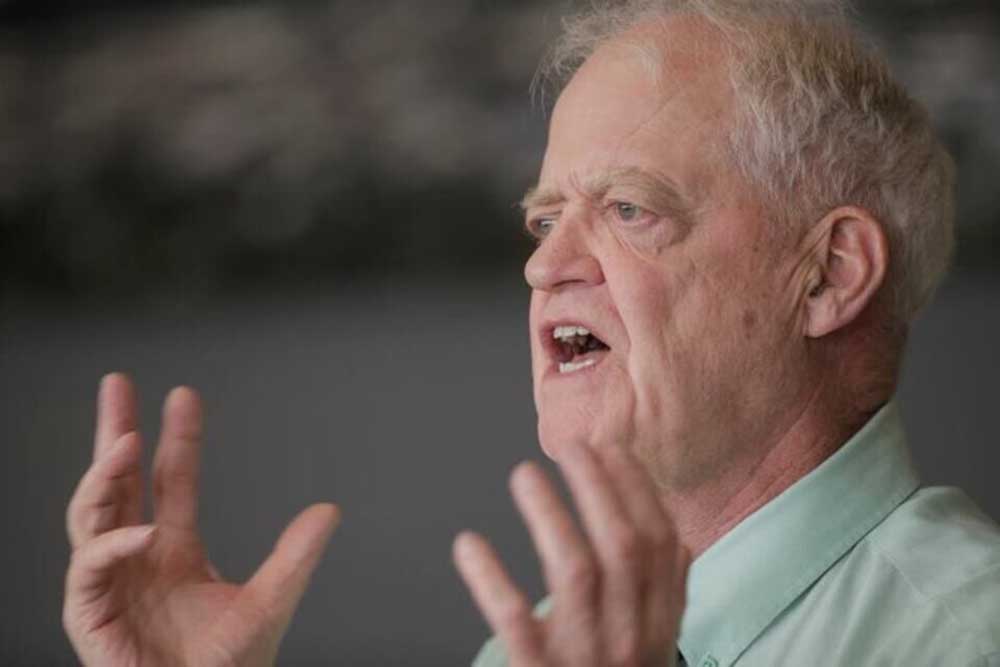Longtime Oregon Senate President Peter Courtney dies at 81
Published 12:45 pm Tuesday, July 16, 2024

- Former Oregon Senate President Peter Courtney, known for his dramatic, eccentric oratory and unexpected antics, died at age 81 from complications related to cancer.
Peter Courtney, a powerful figure in Oregon politics for decades and the state’s longest serving lawmaker and Senate president, has died at age 81 from complications related to cancer.
“Peter Courtney will go down in history as one of the most influential and important leaders in legislative history,” Sen. Elizabeth Steiner, a Portland Democrat and budget co-chair, said in 2022 when Courtney announced he would retire from politics after 20 years presiding over the Senate and 38 years as an Oregon lawmaker.
Courtney was known for his skills as a dealmaker and his insistence on bipartisan support for legislation. He was a talented but idiosyncratic speaker, colleagues say, and a decisive leader willing to leave bills on the cutting room floor when it came time to close down a session.
Betsy Imholt, who served as Courtney’s chief of staff and now runs the Oregon Department of Revenue, said someone once remarked that most people seem monochrome compared to the rainbow of Courtney’s personality.
“That’s the best way I could describe how he is: so charismatic, big personality, big emotions, big thoughts and ideas,” Imholt said. “Everyone remembers when they meet him because there’s just nobody like him.”
His retirement in 2022 followed surgery in 2021 to remove one of his kidneys due to ureteral cancer, the Salem Statesman Journal reported. He also survived colon cancer in the 1990s, Imholt said. Last year, Courtney was diagnosed with congestive heart failure, the Journal reported, and he had a heart valve replaced in January.
Courtney is survived by his wife Margie, three sons and seven grandchildren, Imholt said.
“President Courtney was a friend and ally in supporting an Oregon where everyone can find success and community,” Gov. Tina Kotek said in a news release announcing Courtney’s death on Tuesday. “His life story, the way he embraced Oregon and public service, and his love for the institution of the Oregon Legislature leaves a legacy that will live on for decades.”
Courtney moved to Salem in 1969 with a law degree from Boston University and an offer to clerk for an Oregon judge. He lived for two years at the Salem YMCA and became involved in local politics. Courtney was elected to the Salem City Council in 1974 and to the state House in 1981. He moved to the state Senate in 1999 and became its president in 2003.
He held that position through his late 70s, weathering in recent years questions about his health and critiques of his handling of sexual harassment at the Capitol.
Courtney championed mental health, animal rights, child welfare and his beloved Salem YMCA, Imholt said. He was a key player in the drive to replace Oregon’s aged state psychiatric hospital with new and refurbished facilities and on Tuesday the Salem campus of the hospital will be named in his honor.
Courtney had mixed feelings about such accolades, Imholt said. He’d often opine that he was a plow horse, not a show horse.
“He didn’t believe in solidifying your legacy,” she said. “He just really believed in working your ass off. Showing up. Doing your best.”
Nonetheless, a number of public and private institutions named buildings after Courtney: Western Oregon University’s Health and Wellness Center, a pedestrian bridge in Salem and state-supported housing for veterans at Courtney’s beloved Salem YMCA. The yearslong expansive and over-budget Capitol renovation project, expected to cost around $500 million, is also part of Courtney’s legacy, as he pushed for funding for the project.
Former state Sen. Ginny Burdick, a Portland Democrat, entered the Oregon Senate in 1997, two years before Courtney did — “which I rubbed in his face all the time,” she said — and worked alongside Courtney for the remainder of her Senate career. She described his leadership as transformational.
Courtney was a driving force behind the 2010 ballot measure that made Oregon’s legislative sessions an annual affair, she said. He strengthened the legislative branch, she said, and felt strongly that the Legislature needed to be a “card carrying participant” in the balance of power.
In 2015, Courtney and then-House Speaker Tina Kotek called for Gov. John Kitzhaber’s resignation following revelations that Kitzhaber had misused his public office for personal gain by clearing the way for his fiancee Cylvia Hayes to blur the lines between her public role as first lady and her privately paid advocacy work.
He was frank about how difficult that was. “I never thought I would be here,” he said during an impromptu 14-minute interview that day.
As Senate president, Courtney long insisted on getting at least one Republican “yes” vote before he would agree to bring any bill up in the chamber, although he dropped the practice later years in the face of increased opposition from his colleagues. In the role, he had the power to kill bills unilaterally and in 2019 faced pressure to step down as Senate president after he killed a cap-and-trade bill in order to end Senate Republicans’ quorum-ending walkout. Courtney described it as a practical move to salvage the remainder of the legislative session and other important bills, given he lacked the votes in his own caucus to pass the greenhouse gas bill.
Courtney was known for using his often disarmingly colorful personality and carefully cultivated relationships with other lawmakers to push through major legislation, including a 2017 transportation funding plan and a new business to boost education funding in 2019 that boosted state K-12 education funding by roughly $1 billion annually.
“The sounds of the Capitol were never complete without Peter’s voice reverberating through the halls,” Senate President Rob Wagner, D-Lake Oswego, said Tuesday in a statement about his predecessor. “He was bold and hard-charging, but also tender and caring, always looking for private moments to help a young lawmaker find their way.”
He would challenge lawmakers to take on new roles when he saw their potential, Burdick said. She was happily serving as chair of the Judiciary Committee circa 2007 when Courtney saw the impending economic crisis and asked Burdick to become chair of the Senate Revenue Committee. She said no before eventually capitulating.
“I think he tapped into the cantankerous side of my personality, the stubborn side,” Burdick said. “On reflection, I realized that was where I belong.”
Courtney was tuned into the personal and family lives of fellow lawmakers, Burdick said. He remembered the names of her cats and when she turned 55 harangued her about the importance of getting a colonoscopy — offering to drive up to Portland himself to take her to the appointment, she said. (She got the screening but asked someone else to drive).
“Aside from being a fabulous legislator, he was just a wonderful human being who cared about people,” Burdick said.










